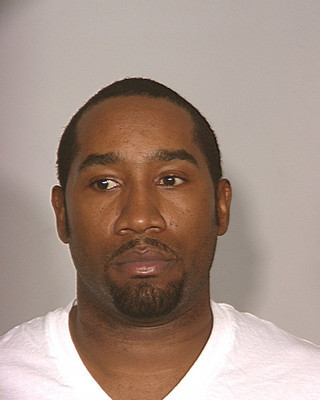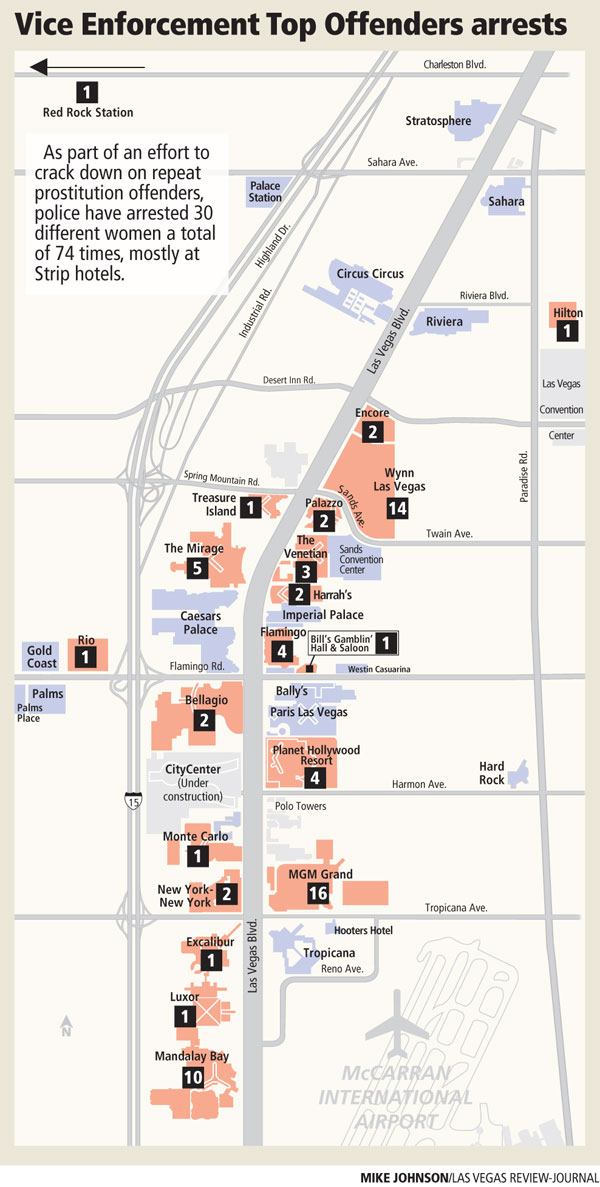Prostitute targeting hits mark
Amanda Rose Teig's nearly 100 misdemeanor arrests and citations in the past three years have yielded only a handful of convictions and no jail time.
When it comes to prostitution-related cases, that's been the norm.
Police and court records examined by the Review-Journal show that in recent years the Clark County justice system has more or less tolerated prostitution on the Strip through dismissals of cases or convictions that resulted in minimal punishment for defendants.
But last month, Teig, 27, was the first target hit in a new Las Vegas police initiative aimed at curbing the sex trade inside Strip hotels.
Her December arrest at the MGM Grand on charges she offered sex to an undercover police officer for $600 led to the first conviction in the Vice Enforcement Top Offenders (VETO) program.
Using a list of Clark County's 50 "most prolific prostitutes," so designated for their long prostitution-related rap sheets, law enforcement officials have vowed that these women's subsequent arrests and convictions will be met with harsher penalties than they've usually encountered.
If a VETO target is found in a hotel that previously banned her, prosecutors have been instructed at the very least to seek trespassing convictions.
Teig's run-in with the undercover officer at the MGM Grand resulted in a misdemeanor charge of soliciting for the purposes of prostitution.
At a bench trial last month, she got a suspended jail sentence, a $1,000 fine, and was ordered by Justice of the Peace Joe Bonaventure to stay off the Strip for six months, or risk being locked up for six months.
Teig's attorney, James "Bucky" Buchanan, has appealed the guilty verdict, claiming selective prosecution of his client, based on her placement on the Vice Enforcement Top Offenders list. Until the appeal is heard in District Court, Teig's ban from the Strip is on hold.
"We feel that what they're doing is unconstitutional," Buchanan said.
But police stand by the policy of getting tough on repeat prostitution offenders.
"We want them to understand we're going to be relentless in ensuring that they know prostitution won't be tolerated within our Strip corridor," said Lt. Karen Hughes, whose vice unit is leading the effort.
Hughes cites the Teig conviction as evidence that women on the VETO list are being sent a strong message that prostitution is illegal in Clark County.
So far, 30 of the 50 women targeted in the initiative have been arrested, mostly for trespassing. The arrests occurred at more than a dozen Strip hotels. One of the women has been booked seven times since January.
Teig has been arrested four times in the past three months. But she is a long way from being the most arrested and cited prostitute in Clark County.
Shiva Monfrad, a 27-year-old Canadian citizen believed to be in the country illegally, has perhaps the most extensive arrest record of any woman on the VETO list.
Monfrad has been booked 168 times in the past five years for prostitution-related offenses. Her cases, however, have been dismissed more than 80 percent of the time, court records show. Her approximately 25 convictions, a few for prostitution and the rest for trespassing, have led to a total of 60 days in jail, a lot of community service, and mandatory AIDS counseling.
Many of Monfrad and Teig's cases never cleared the screening process inside the district attorney's office; they were denied because of "a lack of prosecutorial resources."
Neither woman could be reached for comment.
Monfrad hasn't been arrested since the VETO initiative started, but the man accused of being her pimp was arrested and charged late last year, police said. Duane Williams, 37, has been charged with five felonies, including three counts each of living off the earnings of a prostitute and pandering. He is due in court in June for a preliminary hearing.
Though police don't maintain a list of the area's most prolific pimps, the Review-Journal reported last month that the vice unit has two investigative units that go after men who help facilitate the activities of prostitutes. That effort has led to dozens of arrests in the past year.
But at least one arrest of a pimp suspect led to a Supreme Court challenge that accused police of using racial profiling in anti-pimp policing. After the filing of the challenge, the defendant in the case pleaded guilty to a misdemeanor and was given credit for time served.
The pursuit of pimps didn't keep police from arresting more prostitutes than ever on the Strip last year.
As the VETO initiative kicks into high gear, critics of the effort are still trying to make sense of something they say is impractical, unreasonable, and unconstitutional.
"It isn't a persuasive claim that police are putting a dent in prostitution in Southern Nevada by arresting the same women over and over again and successfully prosecuting one defendant," said Gary Peck, executive director of the American Civil Liberties Union of Nevada.
A multitude of prostitution-related arrests is nothing new in Las Vegas. How the cases are prosecuted is what authorities want to change.
So far, the results have been mixed. A few of the VETO cases have been dismissed, many are still pending, and Teig's -- except for the appeal of her conviction -- went exactly as police and prosecutors had hoped.
Nine different judges have been assigned VETO cases. Hughes said she spoke to Chief Justice of the Peace Ann Zimmerman last week about shepherding all the cases into one or two courtrooms.
Peck said such a conversation between a police lieutenant and a judge is unacceptable, especially considering that Hughes already lobbied support for the VETO program in front of all Justice Court judges last month.
"The idea that police are going to tell the courts how to administratively assign cases exacerbates a problem they created in the first place," Peck said.
At the heart of attorney Buchanan's gripe with the VETO program is his knowledge of how prostitution cases traditionally have been resolved in Clark County. He has represented many prostitution suspects over the years, and never before has he seen the court system so aggressively target individual women.
Buchanan said justice courts -- the busiest in the nation -- are too overburdened to suddenly start spending time and resources on prostitution and trespassing cases.
Assistant District Attorney Christopher Lalli said his office stands by the new initiative and how it has handled prostitution cases in the past. He said the VETO program uses a different strategy to enforce prostitution laws, but periods of strict enforcement of those laws date back to the late 1990s.
"I'd disagree that we've done anything other than treat prostitution cases appropriately," Lalli said.
So, if everything was OK before, is the emphasis on going after repeat prostitution offenders even worth it?
Yes, say Lalli and Sheriff Doug Gillespie.
"It's in line with what I agree is an appropriate philosophy for dealing with all crimes," Gillespie said. "You look at the number of arrests (women on the VETO list) have gotten, and sometimes those cases didn't get the attention they deserved. We hope they will now."
Susan Lopez, co-director of the Desiree Alliance, a group that advocates for the rights of sex workers, said she views the effort with great skepticism.
"Police create the revolving door (of prostitution) by making criminals out of people having consensual, adult sex behind closed doors," she said.
An apparent by-product of the push to rid the Strip of prostitution is that women on the VETO list are relocating from the Strip to downtown Las Vegas.
Monfrad's most recent brush with the law was in November, when she was arrested and accused of engaging in prostitution at the Golden Nugget. It was her first arrest in the city of Las Vegas. That case is pending in Las Vegas Municipal Court.
"There's been a migration to the downtown corridor," Hughes said. "We're cognizant of that, and the hotels need to take aggressive steps to deal with it."
Contact reporter Alan Maimon at amaimon @reviewjournal.com or 702-383-0404.




















